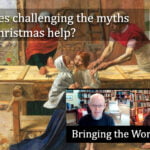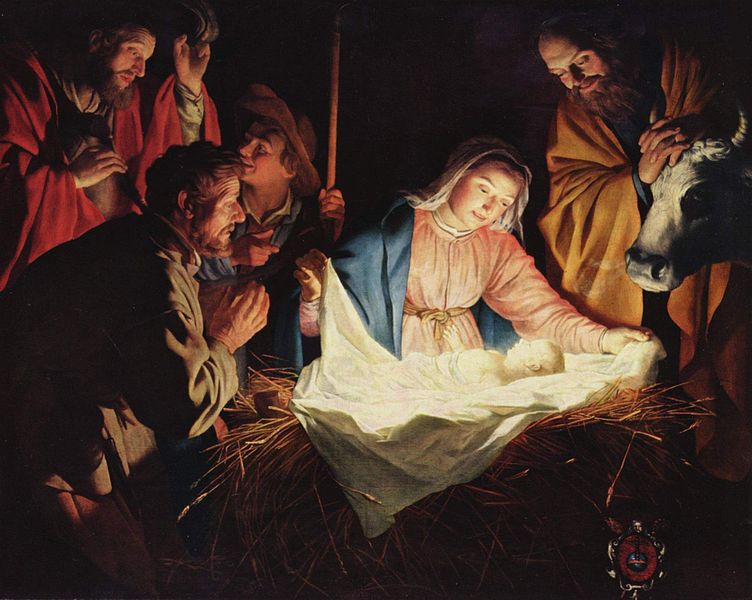It might seem like time to wish everyone ‘A Happy New Year’. But, contrary to our culture’s assumption that Christmas consists of the busyness of consumption and comes to both a climax and a full stop on Christmas Day, for Christians that is when Christmas starts, and we are still in the Christmas season—for another day at least. For many, Christmas is a magical time of lights and presents, food and family. But for others it is a very challenging time, when they are reminded more acutely than ever how life is not as it might have been. For those recently bereaved, the empty chair at the Christmas dinner table is the hardest challenge of all. It is the best of times; it is the worst of times.
The readings for this Sunday, Christmas 2 (John 1.10–18, Eph 1.3–15), take our focus away from our Christmases, and remind us of three gifts from God at Christmas.
The reading from John starts with an extraordinary statement: ‘He was in the world.’ The Word, who was with God and who was God, the one through whom the whole world—the whole universe—came into being, emptied himself (Phil 2.7), and entered into the world that originated in him. This is a mysterious and paradoxical inversion—what was in him, he has now entered. C S Lewis expresses this strange contradiction in the words of Queen Lucy, in the final Narnia chronicle, The Last Battle:
In our world there was once a stable which contained something bigger than the whole world.
John goes on to express it in the climactic phrase ‘The Word became flesh and dwelt amongst us.’ The language he uses is of pitching tents (skenoo, from which we get our word ‘scene’, since tent material was used in theatres). The Word became flesh and pitched his tent amongst us. Or, in the words of Eugene Petersen’s The Message, he became flesh and blood and moved into our neighbourhood. For anyone familiar with the Exodus story, this will immediately recall God’s journeying with his people through the desert on the way to the promised land. But it goes further. The writer Dorothy L Sayers put it like this:
The incarnation means that for whatever reason God chose to let us fall into a condition of being limited, to suffer, to be subject to sorrows and death—he has nonetheless had the honesty and the courage to take his own medicine… He himself has gone through the whole of human experience—from the trivial irritations of family life and the cramping restrictions of hard work and lack of money to the worst horrors of pain and humiliation, defeat, despair, and death… He was born in poverty and… suffered infinite pain—all for us—and thought it well worth his while.
Perhaps the biggest challenge any of us ever face is the challenge of being alone. When we face danger, or difficulty, or challenge and change, the question we always come back to is ‘Will I face this alone?’ But God’s pitching his tent with us signals the end of human loneliness. Nothing can now separate us from the love of God, poured into our hearts by the Spirit of Jesus, who came to us.
Of course, all this also makes remarkable claims about Jesus. This human individual, with whom John has shared his life, with whom he has eaten and drunk, walked and sat, laughed and cried—this person is in fact ‘who is himself God and is in closest relationship with the Father’ (John 1.18). Footnotes in our Bibles show how those copying John’s words struggled with the enormity of this claim—but, John insists, it is true.
When God pitches his tent amongst us, it is not just a passive presence, but one that makes all the difference. Here John seems to sum up Jesus’ ministry as recorded in the other gospels. As he goes on his way, he comes across the sick, the lame, the blind, the lonely and the broken. Once he has gone on his way, people are left well, healed, seeing, restored and whole. As he passes by, it is impossible that nothing should happen. Transformation follows on naturally from tabernacling.
Again, C S Lewis helps us envisage this. In the film version of The Lion, The Witch and the Wardrobe, as Aslan comes closely the snow rapidly melts and the blossoming trees come into bloom. Once he has arrived, what was a cold and barren landscape has turned into lush green.
One of the greatest miracles in nature is the process of metamorphosis that transforms a caterpillar into a butterfly. It is so extraordinary that science still does not really understand how it works. The material is the same—the cells of the caterpillar become the cells of the butterfly—but the way they are arranged is completely different. John uses similarly dramatic language of transformation. The result of God’s tabernacling with us in Jesus is something akin to new birth—although the ‘stuff’ of which we are made is the same, it is as if we begin a whole new life, born of God.
Paul says something similar in the reading from Ephesians 1. It is a very dense passage, hard to take in on first reading—but precisely because of the dramatic and far-reaching change that occurs when we come to faith. We’ve been chosen, called to holiness, adopted, redeemed, forgiven, had grace lavished upon us, had mystery revealed to us, given wisdom and understanding, sealed with the Spirit—the list of ‘all the blessings in the heavenly realm’ goes on and on. It is as if Paul has rushed up to his Christmas tree and ripped open all the enormous pile of presents there in one go! No wonder he talks, in similarly dramatic terms to John, of being ‘a new creation’ (2 Cor 5.17).
Alongside all this, our New Year’s resolutions look like rather feeble attempts to tinker with the details of our lives. What we really need is to live in this remarkable inheritance of truth about who we now are in Christ.
Gift Three: Testimony
What happens when we experience the surprising presence, the tabernacling of God with us? What happens when we start to experience the dramatic transformation that this brings? We are given a testimony to share. It is striking that, whenever John talks about the grace of God in his presence in Jesus, he talks about testimony. In case we have missed it first time around, he includes in this chapter a two-fold account of John the Baptist’s testimony. And it is a theme which John returns to time and again. Jesus himself testifies; the Father testifies on his behalf; the woman by the well runs off to tell he neighbours all about Jesus; the man born blind testifies to those who would expel him…and so it goes on. John starts his letter with the same theme:
That which was from the beginning, which we have heard, which we have seen with our eyes, which we have looked at and our hands have touched—this we proclaim concerning the Word of life. The life appeared; we have seen it and testify to it… (1 John 1.1–2)
It is not difficult to tell people about wonderful Christmas presents, if we are genuinely surprised and excited about them. It is not hard to gossip about free gifts or surprising generosity. Testimony is not a test or a technique, it is not like toothpaste to be squeezed with effort from the end of a reluctant tube. It is the overflow of grace we have experience spilling over into the lives of those around us.
The challenge is that, as John tells us from the start, testimony divides. The climax of John’s account of testimony comes in Jesus’ trial before Pilate; judgement must be made—sides must be taken. But this is true from the outset. ‘He came to his own—and his own did not receive him.’ In the immediate context, ‘his own’ here refers to his own, Jewish people. But if the light of Jesus was the life ‘of all people’ (John 1.4), then ‘his own’ now refers to all of humanity. All wer made in his image; all are loved by him to the extent that he sent his Son (John 3.16); all are sought out by him and offered grace upon grace.
Last weekend we were visiting friends in Poole, Dorset. We had been for a walk on the beach, and were walking back up the chine, the valley and stream that cut down through the cliffs. One family group had gone ahead; the rest of us were behind. But when they got to the car, they realised one of the children, a ten-year-old, was missing. After 45 minutes of us all frantically search up and down the valley, she was found safe and sound with a family who were concerned about her. But in that three-quarters of an hour, her parents faced were etched with the anxiety of searching for one who was loved and lost, desperate that she should be found again. This is a small glimpse into the searching love of God who ‘came to his own.’ Testimony is not only a gift to us, but a gift to all who come to discover God’s love for themselves through the story of how we ourselves were found.
(This is the outline of a sermon preached on Sunday 3rd January 2016 at St Barnabas, Lenton Abbey in Nottingham).
Follow me on Twitter @psephizo
Much of my work is done on a freelance basis. If you have valued this post, would you consider donating £1.20 a month to support the production of this blog?































Thanks Ian
as you say above: Perhaps the biggest challenge any of us ever face is the challenge of being alone. When we face danger, or difficulty, or challenge and change, the question we always come back to is ‘Will I face this alone?’ But God’s pitching his tent with us signals the end of human loneliness. Nothing can now separate us from the love of God, poured into our hearts by the Spirit of Jesus, who came to us.
How does this work out with the pandemic of loneliness? We could say the flip side is that from the early Genisis accounts “it s not good for Adam to be alone” – and that is God speaking when Adam was in a good environment and a perfect relationship with God. Is God pouring his love into our hearts, without friendships, insufficient?
Similarly, linking this post to the one where you linked to the ABC’s bereavement sermon. Jesus death was purposeful. That doesn’t answer the question of unfair deaths (such as his daughter, my twin, countless others) which have no purpose.